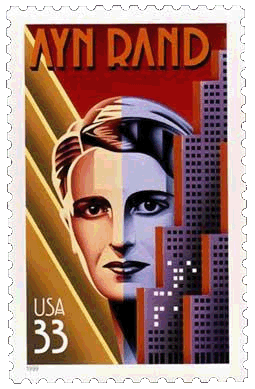|
For Rand, morality is a type of enlightened and rational self-interest―each
individual's moral obligation is to attain his own moral well-being. She defines
value as "that which one acts to gain and/or keep" (1964, 27). The purpose in
pursuing values is the flourishing of one's own life. Values are thus at the
root of morality. Proper moral norms are determined by human nature. Rand's
ethical egoism sees naturalism as leading to facts that become the basis for
objective judgments of value. An objective value is a feature of reality that is
positively related to the flourishing of an individual human being. An objective
value is relational and exists in a life-affirming relationship to a particular
person.
Rand defends the principled pursuit of one's own flourishing. She explains that
promoting one's own interest requires a person to consistently follow principles.
A human being needs to understand, in the framework of principles, the cause and
effect relationships between his actions and the achievement of his values.
Moral principles are formulated through observation and induction regarding the
effects of various forms of action on one's well-being. A man must identify and
follow rational principles if he is to flourish.
Moral principles, as guides to life-promoting actions, are defined in
relationship to the facts that make them essential. For man to survive, he must
discern the principles of action necessary to direct him in his relationships
with other men and with nature. Man's need for these principles is his need for
a code of morality. To flourish, a person must select proper principles and act
in accordance with them. Human flourishing requires the identification and
practice of a particular systematic code of morality. The traditional major
virtues, as recast by Rand, provide the rational principles for this code of
morality―virtues are manifestations of the rational long-range standards or
principles that life as a human being requires.
Rand explains that a virtue is the act by which one gains and/or keeps an
objective value. From another perspective, character traits that objectively and
rationally benefit their possessor are deemed to be virtues. The virtues are
egoistic or partial to oneself, but not in any objectionable sense. A virtuous
character is the result of appropriate actions and is contributive to further
appropriate actions.
Rand explains throughout her writings that the rational pursuit of one's self-interest
requires the consistent practice of seven principal virtues: rationality,
honesty, independence, justice, integrity, productiveness, and pride.
Unfortunately, she did not produce a comprehensive, systematic, and detailed
work with respect to the virtues. On the positive side, Tara Smith (2006) has
endeavored to provide a detailed explanation of the virtues in the context of
Rand's rational egoism.

Rationality, the primary virtue, involves full focus, commitment to reality, and
the constant expansion of one's knowledge. Rationality is one's recognition and
acknowledgment of reason as one's only source of knowledge, judge of values, and
guide to action. Reason is the faculty that identifies and integrates the
material provided by man's senses; it is man's fundamental means of survival and
a practical instrument for gaining the values that further one's life.
Rationality is concerned with the method by which an individual reaches his
conclusions rather than being concerned with the particular conclusions that he
comes to. Rationality is essential to the kind of practical actions required to
attain human flourishing. It involves acceptance of the conditions necessary for
man's flourishing. The virtue of rationality requires an individual to act on
his rational conclusions.
Rationality requires the exercise of six additional derivative virtues that can
be viewed as expressions of rationality (48-74). Honesty is the refusal to fake
reality―it is the rejection of unreality and the recognition that the unreal can
have no value. Misrepresenting reality does not change reality. Facts are
independent of a person's beliefs. For honesty, a person must renounce
misrepresentation, artifice, and evasion. He must also develop an active mind
and act on his knowledge―an honest person seeks knowledge because he needs it to
act properly. Honesty is practical. An individual must be truthful with himself,
and not pretend that reality is something other than what it is. Self-deception
is counter-productive. Dishonesty diverts an individual from identifying and
seeking rational plans for gaining objective values. Dishonesty diminishes one's
self-esteem and pride. It also makes facts and one's own rationality into
enemies. Whereas an honest person depends on others' virtues, a dishonest person
relies upon their vices.
Through dishonesty, a man makes himself dependent on others' standards,
expectations, judgments, and ignorance. A liar depends upon others' naïveté
and he must strive to keep them unaware. In reality, an individual is apt to
profit the most from others' rationality, knowledge, and virtues. Honesty, like
all the virtues, is contextual and does not require one to tell the truth in all
cases. It is permissible (and moral) to lie in order to protect a value that is
being threatened. The use of force or fraud by an aggressor changes the
conditions and the relationship between honesty and life. Lying is wrong when
done in an attempt to gain a value (75-105).
|

